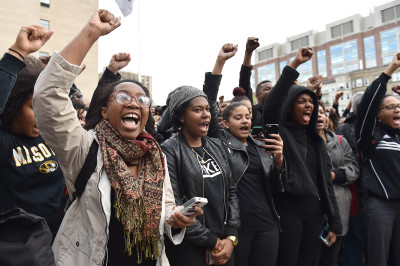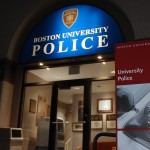Boston University students have expressed support and concern for racial issues through social media and demonstrations following recent events at the University of Missouri, bringing to question how racial issues should be addressed on campus.
Many BU students took their acts of solidarity to social media as protests against racial inequality had erupted at colleges and universities across the nation. A number of BU students reposted the Facebook status: “To the students of color at Mizzou, and everywhere, I, a student of color at Boston University, stand with you in solidarity. To those who would threaten your sense of safety, we are watching. #ConcernedStudent1950 #InSolidarityWithMizzou”
The “Blackout: Mizzou We Stand with You” rally Friday was created to encourage all Boston area students to come together and wear black as they stand in solidarity with students of color at Mizzou, TeAndrea Jackson, one of the rally’s organizers, said.
Jackson, a junior in the College of Arts and Sciences, said she was shocked to see the impact the rally had on the BU community and surrounding areas.
“[People] just needed an opportunity [to show support], and I was very glad to give them that opportunity,” Jackson said.
Pedro Falci, assistant director of the Howard Thurman Center for Common Ground, said he is proud to see students rally behind a generational issue.
“Students are coming together for a common purpose,” Falci said. “I commend them for their bravery in organizing because it shows that no matter who was out there, they were there to create a profound moment in history.”
Although there had been wide demand to properly address on-campus racial injustice, erasing a “sense that black people think that they don’t do very well [in colleges]” continues to be a challenge, John Thornton, director of BU African American Studies program, said.
“A great deal of help could be done if people think before they speak about things,” Thornton said. “A lot of students should try to educate themselves. A lot of white students who come here, they very often didn’t have black friends back home [and] because there’s so few black students, I think they feel overwhelmed. Make somebody a friend before you start asking them questions.”
BU has the lowest African-American student population among other institutions in the Boston area with only 3.8 percent, Thornton said. Having a number of “professors of color demonstrate to the students their competence” hadn’t been enough to reduce the tension, Thornton added.
Taylor Robinson, a junior in the College of Communication, said most of the racism she experiences at BU is subtle and stems from the issue of affirmative action.
“People make comments like I’m only here because I’m black or they worked hard to get here and I didn’t,” Robinson said. “It’s not a state school that costs $12,000, so people will say, ‘I’m paying all this money’ or ‘I didn’t get scholarships.’ My friends have had people come up to them and say, ‘I worked hard to get into BU, can you say the same?’”
Sarah Yoo, a junior in CAS, said she has heard about racial incidents occurring on campus, but has not experienced any of them personally.
“It’s interesting because one of the reasons I chose to transfer from another school to here was because of the racism that existed [in the previous school] and how infuriating it was for the administration to help them,” Yoo said. “Coming here, I think it’s better, but hearing all of the stuff that’s happened, [racism] is kind of everywhere.”
Karen Zenteno, a second-year graduate student in the School of Theology, said BU aims to have a welcoming environment for students but the university could further combat issues of racism by providing students with different discussions on race through lectures and seminars.
“It’s where you can open up a space where students are able to ask questions [of racial issues],” Zenteno said. “Anything that talks about how we, on a very personal level, can steer away from being racist to one another, and even as a person of color, how can I not be racist or ignorant towards another person of color.”
Stefanie Grossano, a senior in CAS, said BU should make a greater change in the education of students by mandating an ethnic studies program.
“Every person would be required to take a sociology class where you start to understand the structures that exist in society,” Grossano said. “People are not confronted with those [issues] and they need to be if we are considering this an educational experience. Help people confront their privilege in an academic space, and not put the label on people of color to do that educating.”















